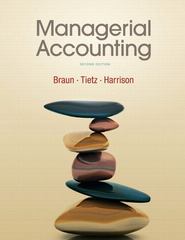Question
Goal: Please answer the questions below. The main goal of this homework is to see if you can calculate the profit maximization point for this
Goal:
Please answer the questions below. The main goal of this homework is to see if you can calculate the profit maximization point for this small wedding cake business. I hope that you will be able to merge your knowledge of basic accounting and microeconomic theory in order to calculate the profit maximization point, make comments about efficiency, and make logical recommendations to the firm's management to ensure their future success.
Current Situation:
The local wedding cake business was very competitive during 2012. Delicious Deserts was the only wedding cake bakery in the entire county of two million people for several years. They often charged as much as $300 to $500 for each wedding cake. But a new competitor recently came into the market and started selling "discount wedding cakes" for less than $150. The quality and the taste of the discount wedding cakes were acceptable for most of their customers. Both businesses operated in a low-to moderate-income county in California where the average household income was not much higher than $40,000 per year.
The Challenge For Delicious Deserts:
At first the news of a low-cost competitor was terrible news for Delicious Deserts. They had no choice. They had to charge from $300 to $500 per wedding cake to cover their high costs. However, because of this new competition, the husband and wife owners of Delicious Deserts decided to make the business more efficient and lower costs. They invested in better ovens and created better tasting cakes using special ingredients. Their customers went crazy over their new and unique 80 proof Italian Rum Wedding cake that actually got people slightly drunk if they ate more than three slices.
To boost sales during 2012 they hired part-time telemarketers and social media experts. They also increased their advertising in traditional media such as local wedding magazines. They also displayed eye-catching ads in local churches, entertainment centers and jewelry stores.
They also experimented with a new pricing model in which they lowered prices each quarter. Indeed, they found that as they lowered their prices, they sold more cakes. They hired an "A" student who took a microeconomics class with Professor Ed Torres for an elasticity analysis. The student estimated that the price elasticity for wedding cakes was 1.25 (elastic) and that the income elasticity was 2.10 (a luxury good). The owners of Delicious Deserts were not aware of this information. The student told them that they made a huge pricing strategy error for many years by charging high prices on an elastic good within a low-to moderate-income county.
The profit and loss statement below shows that Delicious Deserts made a Total Revenue of $275,000 and sold 1,375 wedding cakes. During 2012, they made three times (3X) more than they did versus 2011. Of course, because they invested in new ovens, made more cakes, and hired new part-time staff, the cost of doing business also rose. The net profit for 2012 was a slim $32,175. The salary for a professional desert baker averaged $70,000 per year in California.
Please examine the profit and loss statement on the next page, then answer the questions on pages 4 through 6.
Delicious Deserts, Incorporated
Income Statement For The Year Ending December 31, 2012
Revenues
Gross Sales....................................................................$275,000
Less: Sales Discounts ..................................................$2,500
Less: Returns (Cancelled Weddings)...........................$2,000
Net Sales...............................................................................................$270,500
Cost of Goods Sold
Beginning Inventory (January 1).................................$18,000
Cost Of Ingredients To Bake Cakes............................$109,500
Total Cost of Goods For Sale......................................$127,500
Less: Ending Inventory December 31.........................$15,000
Cost of Goods Sold..............................................................................$112,500
Gross Profit.....................................................................................................$158,000
Operating Expenses
Selling Expenses
Sales Commissions........................................$31,000
Advertising...................................................$16,000
Other Selling Expenses (Internet).................$18,000
Total Selling Expenses...............................................$65,000
General and Administrative Expenses
Professional & Office Salaries.................................$20,500
Utilities....................................................................$5,000
Office Supplies........................................................$1,500
Bank Interest Paid on Loans....................................$3,600
Insurance.................................................................$2,500
Rent (Fixed Cost)....................................................$17,000
Total General & Administrative Expense.............................$50,100
Total Operating Expenses..................................................$115,100
Net Profit Before Taxes..............................................................................$42,900
Less: Federal/State/Local Taxes................................................................$10,725
NET PROFIT.............................................................................................$32,175
Question
Why isn't it a good idea for them to produce and sell as many cakes as they can? Is it more profitable to sell less cakes at this current stage of their business?
Step by Step Solution
There are 3 Steps involved in it
Step: 1

Get Instant Access to Expert-Tailored Solutions
See step-by-step solutions with expert insights and AI powered tools for academic success
Step: 2

Step: 3

Ace Your Homework with AI
Get the answers you need in no time with our AI-driven, step-by-step assistance
Get Started


